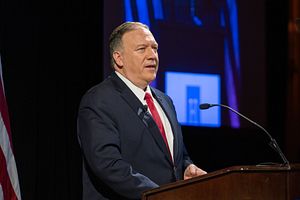U.S. Secretary of State Mike Pompeo downplayed the possibility of another summit between President Donald Trump and North Korean leader Kim Jong Un before the U.S. presidential election, saying Trump would only want to engage if there were real prospects of progress.
South Korean President Moon Jae-in, who has called for another Trump-Kim meeting ahead of the election in November, acknowledged Thursday that U.S. and South Korean relations with North Korea were still like “walking on ice” after two years of high-stakes summitry.
During a parliamentary speech, Moon urged North Korea to return to inter-Korean dialogue, which has also stalled, and called for South Korean lawmakers to support government policies aimed at reviving cross-border cooperation. He made no direct comment on the prospects for U.S.-North Korea talks.
Pompeo’s comments during a forum in Washington on Wednesday followed repeated North Korean statements insisting it would no longer gift Trump high-profile meetings he could boast as foreign policy achievements when it’s not being substantially rewarded in return.
“The North Koreans have given mixed signals, but the truth is President Trump only wants to engage in a summit if we believe there’s a sufficient likelihood that we can make real progress in achieving the outcomes that were set forth in Singapore,” Pompeo said during the event hosted by The Hill, referring to the first Trump-Kim summit in June 2018.
“You need to have a willing partner, and the North Koreans have chosen at this point in time not to engage in a way that can lead to a potential solution. We hope they’ll change their mind.”
Trump and Kim have met three times since embarking on high-stakes nuclear diplomacy in 2018, beginning with their meeting in Singapore where they issued vague vows for a nuclear-free Korean Peninsula without describing when and how it would occur.
But negotiations have faltered since their second summit in February 2019, where the Americans rejected North Korean demands for major sanctions relief in exchange for a partial surrender of its nuclear capability.
Some analysts believe North Korea will avoid serious talks with the Americans for now before attempting an eventual return to negotiations after the U.S. election. They say North Korea likely doesn’t want to make any major commitments or concessions when there is a chance U.S. leadership could change.
But others say another Trump-Kim meeting wouldn’t be impossible. Trump could opt for something dramatic to improve his sliding poll numbers while Kim could see a window of opportunity closing with a Trump presidency and attempt a quick exchange between reversible denuclearization steps and hard-to-reverse sanctions relief.
Amid the stalled negotiations the Trump administration, North Korea has been ramping up pressure on the South, cutting off virtually all bilateral cooperation and blowing up an inter-Korean liaison office in its territory last month.
The made-for-TV demolition followed months of North Korean frustration over Seoul’s unwillingness to defy U.S.-led sanctions and restart joint economic projects that would help revive the North’s broken economy.
In a statement last week, Kim Yo Jong, the powerful sister of the North Korean leader, said she doesn’t expect another summit with the United States this year, insisting that such a meeting would be “unpractical” for the North.
But she also said “you never know,” saying that a meeting would depend on the determination of the two leaders, and called for major concessions from Washington to keep alive the nuclear diplomacy.
The prolonged stalemate in nuclear talks have raised doubts on whether Kim Jong Un would ever agree to fully relinquish the weapons he likely sees as his strongest guarantee of survival. Some experts see him as trying to shape the diplomacy as an arms reduction negotiation between nuclear states rather than talks that would culminate in a surrender of his nuclear program.
By Kim Tong-hyung for the Associated Press.

































